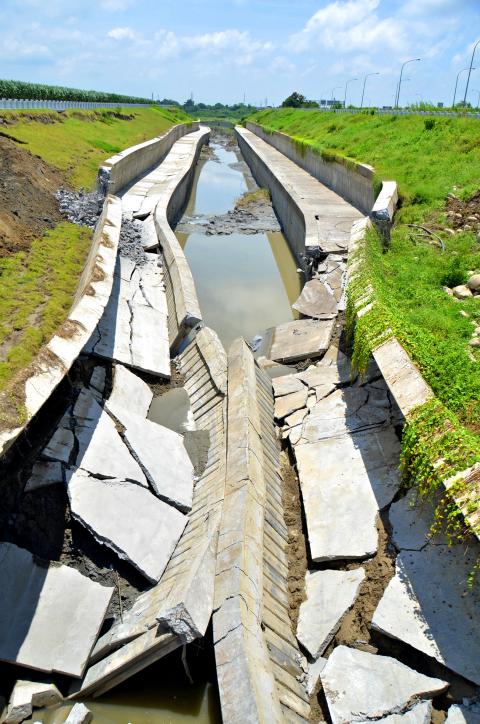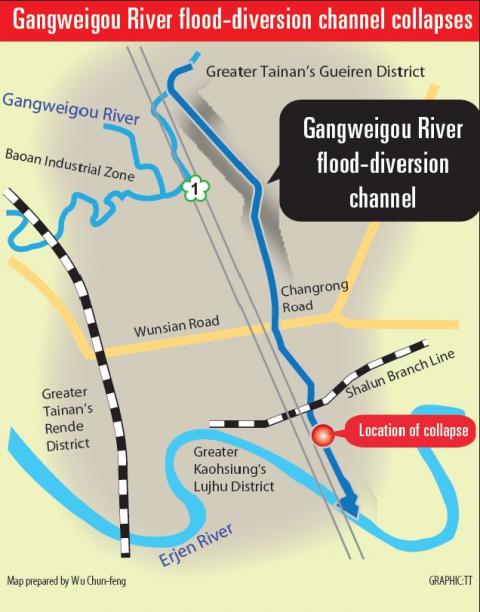A 170m stretch of the Gangweigou River (港尾溝溪) flood-diversion channel in Greater Tainan collapsed in the early hours of Friday after torrential rains that hit the south on Tuesday, prompting concerns over the sturdiness of the structure, which had been inaugurated three weeks ago.
The Gangweigou diversion channel, constructed by the Ministry of Economic Affairs’ Water Resources Agency, spans 3.8km and cost about NT$1.5 billion (US$49.9 million). The project was launched in March 2012 and was only recently completed, with an inauguration ceremony held on July 26 this year.
The Water Resources Agency’s Sixth River Management Office yesterday said it would complete emergency repair tasks in the ruptured area before Wednesday.

Photo: Wu Chun-feng, Taipei Times
Sixth River Management Office director Tsai Tsung-hsien (蔡宗憲) said the Gangweigou diversion channel was designed to withstand 175 tonnes of water per second, as seen in once-a-generation events. However, the rainwater in the channel on Tuesday flowed as rapidly as 250 tonnes per second, resulting in structural damage, he said.
Unconvinced, Greater Tainan City Councilor Wang Ting-yu (王定宇) of the Democratic Progressive Party said the flood-diversion channel was “the most expensive ‘tofu-dreg’ project in history,” adding that it could endanger the nearby National Sun Yat-sen Freeway (Freeway No. 1).
He also called into question the soundness of the construction materials used in the channel, alleging that contractors may have cut corners during construction and demanding that authorities investigate.

Tsai responded to Wang’s suspicions by saying that the flood-diversion channel was built of concrete sheet piles, which are bound together by a cap beam.
He also denied that the facility would pose a threat to the nearby freeway, saying there is about 10m of space between the two.
Meanwhile, Greater Tainan Mayor William Lai (賴清德) interceded for the Water Resources Agency, saying the channel served its purpose because it prevented the Baoan Industrial Zone (保安工業區) from flooding.
Although some problems have occured following the wet weather, the facility is still “under warranty” and the city government would demand that the contractor fix it as soon as possible, he said, adding that no extra payment will be made by the city government for repairs.
However, some residents near the channel said they had noticed a deformity in its structure before the storms, saying the catchment basin had begun slanting as early as Aug. 8, which they said could have resulted from the concrete sheet piles having bases that are too shallow.
The Water Resources Agency said it would perform a thorough investigation along the canal and would demand compensation from its contractors if they were found to be responsible.
The Gangweigou diversion channel was built to prevent the Gangweigou River from flooding the low-lying Rende District (仁德) — near where it joins the Erjen River (二仁溪) — and is said to be capable of reducing a flood-prone area by 626 hectares.
Additional Reporting by Tsai Wen-chu

CHAOS: Iranians took to the streets playing celebratory music after reports of Khamenei’s death on Saturday, while mourners also gathered in Tehran yesterday Iranian Supreme Leader Ayatollah Ali Khamenei was killed in a major attack on Iran launched by Israel and the US, throwing the future of the Islamic republic into doubt and raising the risk of regional instability. Iranian state television and the state-run IRNA news agency announced the 86-year-old’s death early yesterday. US President Donald Trump said it gave Iranians their “greatest chance” to “take back” their country. The announcements came after a joint US and Israeli aerial bombardment that targeted Iranian military and governmental sites. Trump said the “heavy and pinpoint bombing” would continue through the week or as long

TRUST: The KMT said it respected the US’ timing and considerations, and hoped it would continue to honor its commitments to helping Taiwan bolster its defenses and deterrence US President Donald Trump is delaying a multibillion-dollar arms sale to Taiwan to ensure his visit to Beijing is successful, a New York Times report said. The weapons sales package has stalled in the US Department of State, the report said, citing US officials it did not identify. The White House has told agencies not to push forward ahead of Trump’s meeting with Chinese President Xi Jinping (習近平), it said. The two last month held a phone call to discuss trade and geopolitical flashpoints ahead of the summit. Xi raised the Taiwan issue and urged the US to handle arms sales to

State-run CPC Corp, Taiwan (CPC, 台灣中油) yesterday said that it had confirmed on Saturday night with its liquefied natural gas (LNG) and crude oil suppliers that shipments are proceeding as scheduled and that domestic supplies remain unaffected. The CPC yesterday announced the gasoline and diesel prices will rise by NT$0.2 and NT$0.4 per liter, respectively, starting Monday, citing Middle East tensions and blizzards in the eastern United States. CPC also iterated it has been reducing the proportion of crude oil imports from the Middle East and diversifying its supply sources in the past few years in response to geopolitical risks, expanding

Pro-democracy media tycoon Jimmy Lai’s (黎智英) fraud conviction and prison sentence were yesterday overturned by a Hong Kong court, in a surprise legal decision that comes soon after Lai was jailed for 20 years on a separate national security charge. Judges Jeremy Poon (潘兆初), Anthea Pang (彭寶琴) and Derek Pang (彭偉昌) said in the judgement that they allowed the appeal from Lai, and another defendant in the case, to proceed, as a lower court judge had “erred.” “The Court of Appeal gave them leave to appeal against their conviction, allowed their appeals, quashed the convictions and set aside the sentences,” the judges